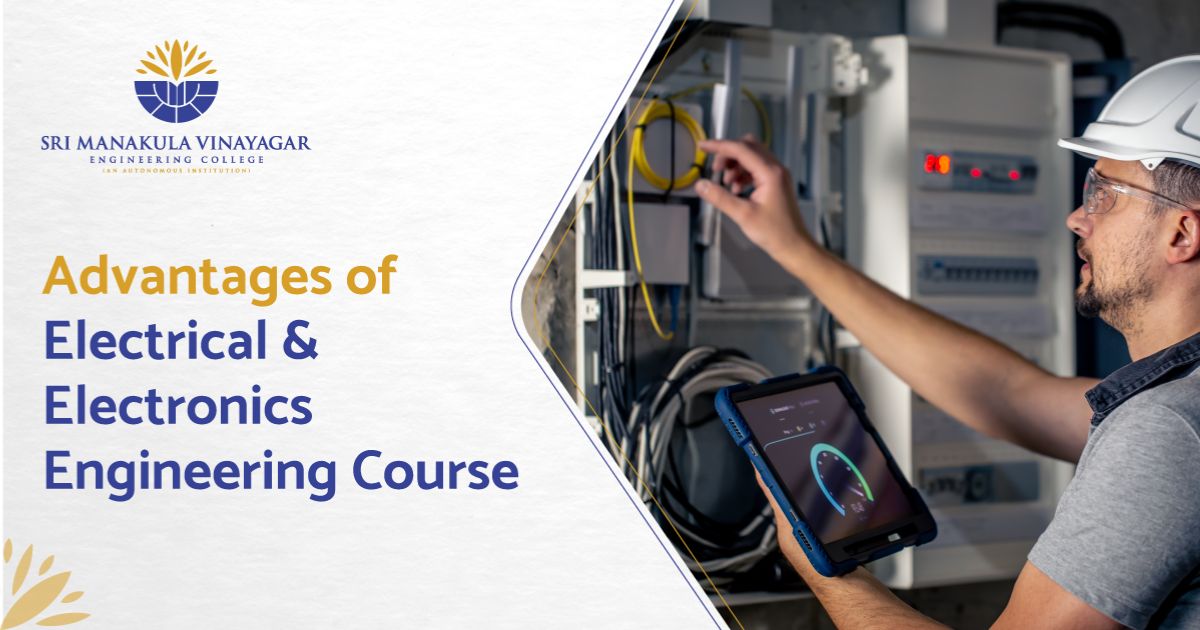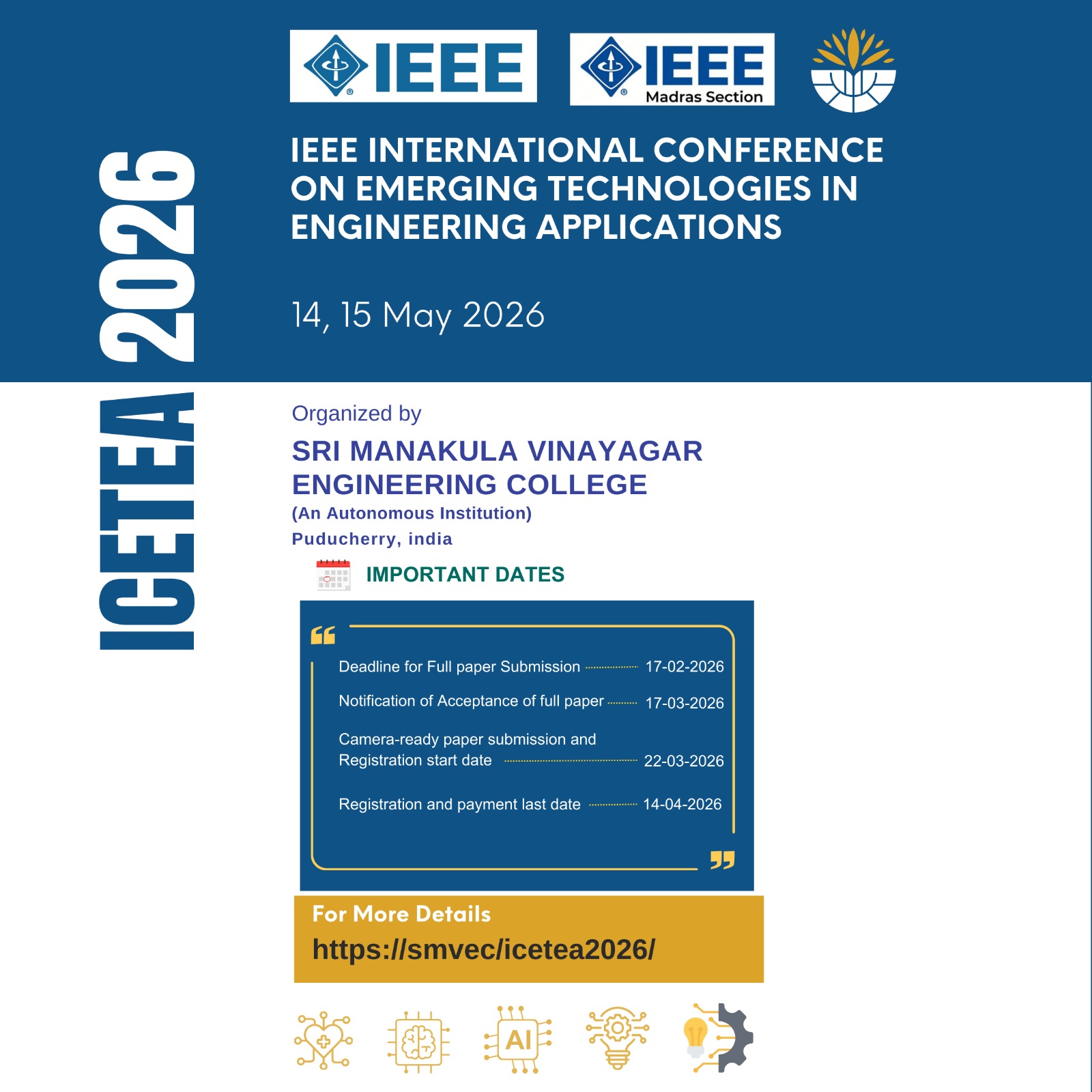Electrical and Electronics Engineering (EEE) is a dynamic field that combines the principles of electrical and electronics engineering, which are important for technologically advanced industries. Moreover, I have a high pay scale, a good career perspective, and flexible jobs. This field needs constant learning and brings great projects and strong problem-solving skills together, making it a dynamic and promising career option.
Why to Choose Electrical and Electronics Engineering
Electrical and electronics engineering is ideal for students interested in technology and innovation. The company offers many opportunities with applications ranging from power systems to electronics and power design technology.
If you are exploring a career in EEE, you need to know its scope, current trends, and where the future of this profession lies.
This blog will discuss the top 10 advantages of Electrical Electronics Engineering. It is a smart decision for any upcoming engineer.
Core subjects in an Electrical and Electronics Engineering curriculum?
- Circuit theory
- Electronics
- Electrical machines
- Power Systems
- Control systems
- Communication systems
10 Advantages of Electrical and Electronics Engineering
Here are ten advantages of Electrical Electronics Engineering
1. Career opportunities
EEE offers vast job opportunities by generating business models in areas such as power generation, telecommunications, electronics, automation and renewable energy. Graduates can explore roles in both the private and public sectors.
2. High demand in various industries
As industries increasingly rely on electrical systems and electronics, the demand for skilled EEE workers continues to grow. Electrical engineers are in high demand for infrastructure or advanced construction. Some high-demand industries are manufacturing, construction, healthcare, and software.
3. Innovation and creativity
Electrical and electronics engineering encourages innovation and creativity. Engineers in this field lead the way in developing new technologies, such as smart grids, renewable energy solutions and advanced networks.
4. Competitive Salaries
EEE are among the highest-paid professionals in the engineering field. With their specialised skills and knowledge. Moreover, high-demand areas like power systems and electronics design. Sectors such as AI, robotics and green energy.
5. Global opportunities
Electrical and electronics engineering is global, offering opportunities for international projects, collaboration and business activities. A Skilled EEE expertise is with real-time technologies in various industries, including power generation, transmission and distribution or new tech domains that help them to work in a global environment.
6. Hands-On Learning Opportunities
It is also important before studying to start learning the process that can enhance practical learning through projects well-skilled with new advanced technology. This focus is on project-based learning. These hands-on experiences help students apply theoretical concepts to real-world scenarios, enhancing their problem-solving and critical-thinking skills.
7. Technological Advances
With the rise of AI, automation, and IoT, electrical and electronic technologies have an essential role in developing these technologies. With the help of technologies like AI, IoT, and IP networking, we can use these for careers, stay experts in this growth, and be prepared for future challenges.
8. Extensive use in daily life
Electrical and electronics engineers design and maintain essential systems. For example, from household electronics to large-scale power distribution networks. Their work is integral to the functioning of a day-to-day lifestyle.
9. Entrepreneurial Opportunities
Electrical and electronics engineers often start their own tech companies, contributing to innovations in renewable energy solutions, robotics, or electronics manufacturing. If skilled engineers have the ability to develop innovative electrical and electronic products, it can lead to successful entrepreneurial careers.
10. Government Sector
EEE graduates have excellent opportunities in government sector roles, such as in energy departments, transportation, R&D and public utilities, providing stable and rewarding career paths.
Top domains in electrical and electronic engineering
Electronics and electronics (EEE) are large and constantly evolving. Here are some of the key areas where electrical and electronics engineers contribute the most:
- Power Systems: With the increasing demand for electricity and the integration of renewable energy sources, power system engineering is an important part of EEE.
- Control Systems and Automation: Control systems are important in industry for automating machinery and processes. EEE engineers design and implement control systems that improve efficiency and accuracy in areas such as robot manufacturing and aerospace.
- Embedded Systems: Embedded systems are essential in modern electronics, from consumer devices to automotive applications. EEE engineers design and integrate hardware and software to create high-performance, reliable, and advanced systems.
- Communication Systems: Telecommunications and wireless communications play an important role in the modern world. Engineers in this field work to design and optimise networks, antennas and communications systems to improve communication and data transfer speeds.
- Renewable Energy and Smart Grid: With the global focus on sustainable development, EEE businesses are leading the way in developing renewable energy solutions and smart grid technologies and implementing and ensuring clean, efficient energy and distribution.
How SMVEC Supports EEE Students?
Sri Manakula Vinayagar Engineering College, the Department of Electrical and Electronics Engineering, is focused on empowering our students by training them in relevant skills. This is how SMVEC helps its students:-
- Hands-On Experience: SMVEC focuses on a learning-by-doing approach, offering practical exposure through labs, projects, and internships. This allows students to implement their theoretical knowledge in the real world.
- Skill Enhancement Programs: SMVEC organises programs like soft skills training, power system design, and electronics design in sectors such as AI, robotics, and green energy. Experts train them for the job market.
- Outstanding Placement Support: The placement cell at SMVEC endeavours to channel students towards the best organisations, thus ensuring them the best job after course completion.
Conclusion
Choosing Electrical and Electronics Engineering as a career opens the door to a world of opportunities, innovation, and growth. With its expanding scope, current trends, and future, this field is an excellent choice for aspiring engineers. Institutions like Sri Manakula Vinayagar Engineering College play a vital role in preparing students for success in this dynamic industry, as well as training them with the skills and knowledge needed to thrive.
By pursuing a degree in Electrical and Electronics Engineering, you are investing in your future and becoming part of a field that is shaping the world.
FAQs
1. Why should I choose electrical and electronic engineering as a career?
EEE offers career opportunities, competitive salaries, and the opportunity to work on cutting-edge technologies that are shaping the future of business
2. What job roles are available after completing an EEE degree?
Graduates can find roles in power generation, telecommunications, electronics manufacturing, automation, and renewable energy.
3. How does SMVEC prepare EEE students for jobs?
SMVEC organises programs like soft skills training, power system design and electronics design. Sectors such as AI, robotics, and green energy. Experts train them for the job market.
4. Is there a global demand for electrical and electrical engineers?
Yes, EEE professionals are in demand worldwide, and there are opportunities in industries ranging from energy to electronics and telecommunications.




